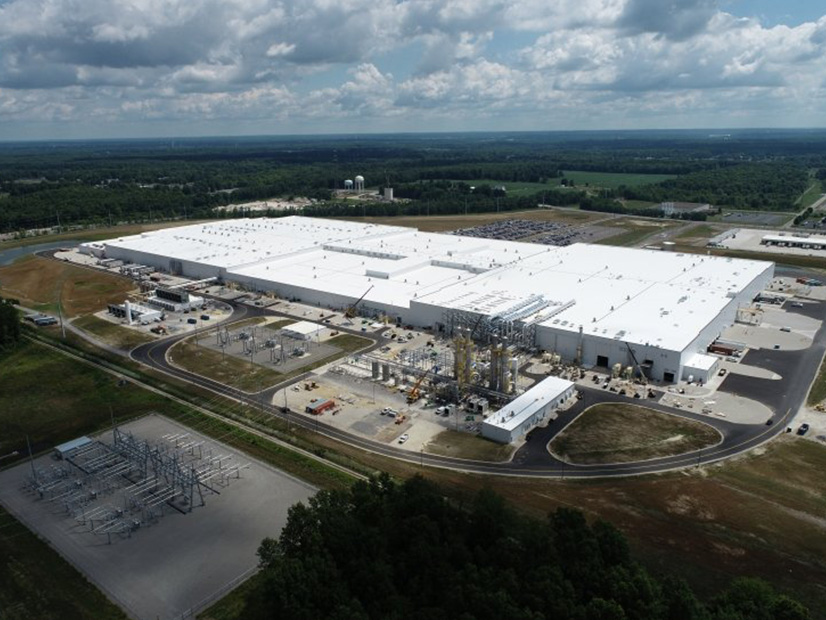The Department of Energy’s Loan Programs Office (LPO) announced Monday it is providing a $2.5 billion loan to Ultium Cells, the joint venture of General Motors (NYSE:GM) and Korean battery producer LG Energy Solution, to help finance the construction of new lithium-ion battery manufacturing plants in Michigan, Ohio and Tennessee.
One of the plants, in Warren, Ohio, is already online, producing cells, according to Brooke Waid, a company spokesperson. A plant in Spring Hill, Tennessee, has begun installation of equipment and is expected to be online in late 2023, while construction of a Lansing, Michigan, facility began in September and will continue through 2023. Production there should begin in 2024, Waid said.
The three plants are expected to produce 130 GWh of EV batteries, the equivalent of saving 480 million gallons of gasoline per year, according to the LPO. The projects funded will also create 6,000 construction jobs and another 5,100 jobs in plant operations. The Warren workforce includes 700 members of the United Auto Workers, according to a DOE press release.
“DOE is flooring the accelerator to build the electric vehicle supply chain here at home — and that starts with domestic battery manufacturing led by American workers and the unions that support them,” Energy Secretary Jennifer Granholm said in the release. “This loan will jumpstart the domestic battery cell production needed to reduce our reliance on other countries to meet increased demand.”
EVs now account for more than 5% of all new car sales in the U.S., a key industry benchmark for market growth, according to industry analysts. President Joe Biden wants half of all new car sales to be EVs by 2030. The Infrastructure Investment and Jobs Act includes $7.5 billion to help build out a national network of EV chargers, and the Inflation Reduction Act includes tax credits of up to $7,500 for new EVs and $4,000 for used EVs.
The Ultium batteries use “large format, pouch-type cells,” according to GM. The cells “waste less space and can stack on top of each other like pancakes or vertically like slices of toast. This simple modular design makes it easy for engineers to optimize energy density and vehicle layout,” according to information on the automaker’s website.
In other words, the batteries cost less and can provide more range, according to GM.
The company says it is also working to source as many of its materials as possible from the U.S. as it works toward its goals of producing 1 million EVs per year by 2025 and eliminating all tailpipe emissions from new light-duty vehicles by 2035.
The importance of domestic supply chains and manufacturing jobs was a common theme in reactions to the loan from state and federal government officials.
Michigan Gov. Gretchen Whitmer (D) quickly hailed the loan in a tweet, saying “This will bring supply chains home and ensure Michigan is the best place to innovate, design, and manufacture the future.” The Lansing plant should create 1,700 jobs, Whitmer said.
Quoted in the DOE press release, Sen. Sherrod Brown (D-Ohio) also spoke of the growing competition between states to grab their share of EV manufacturing dollars and jobs. “This loan will support Ohio in taking another step to lead the country and the world in producing sustainable technology and electric vehicles that Americans will need and drive over the next century,” Brown said.
Domestic Supply Chains
The Ultium loan caps a series of administration announcements aimed at expanding the domestic supply chain for batteries, a particular weak point for the industry. Lithium-ion batteries are critical for EV market growth, and China currently controls upwards of 60% of the global market for raw lithium refining and processing.
In October, DOE announced $2.8 billion in grants to 20 companies to supply minerals critical to battery production and bolster domestic manufacture of batteries for electric vehicles and the grid. The companies will use the money to build or expand facilities in 12 states to extract and process battery materials such as lithium and graphite and to manufacture battery components, in some instances, from recycled materials. (See DOE Awards $2.8 Billion to ‘Supercharge’ Battery Production.)
The grants were part of the American Battery Materials Initiative launched by the White House and DOE, to help build out a critical mineral supply chain in the U.S. and in partnership with U.S. allies.
The White House is also hosting an Electrification Summit on Wednesday, where transportation electrification will be a key topic.




